WHEN I WAS in the grip of despair about a situation of unrequited love, I decided to make a list of the benefits of that state. Alas, I cannot find that list, and I don’t remember a single thing I wrote in an effort to assuage my pain. What I do remember, though, are three masterful articulations of unrequited love, each of which I read repeatedly—and still do, even if I happen to be in a state of blissfully requited love, as if keeping my emotional muscles toned for potential future hurt.
I consider Mary Oliver the best and most prolific living poet. Attend one of her public readings and you’ll hear her fans shout out requests, as if the septuagenarian had walked on stage with a bass guitar slung over her shoulder. They’ll likely call for her to read her iconic “Wild Geese,” which begins with the memorable lines, “You do not have to be good./ You do not have to walk on your knees/ For a hundred miles through the desert, repenting./ You only have to let the soft animal of your body/ love what it loves.” This is not exactly a poem about unrequited love, but it is a love poem to everyone, assuring us that we are loved: “Whoever you are, no matter how lonely, the world offers itself to your imagination,/ calls to you like the wild geese, harsh and exciting—/ over and over announcing your place/ in the family of things.”






